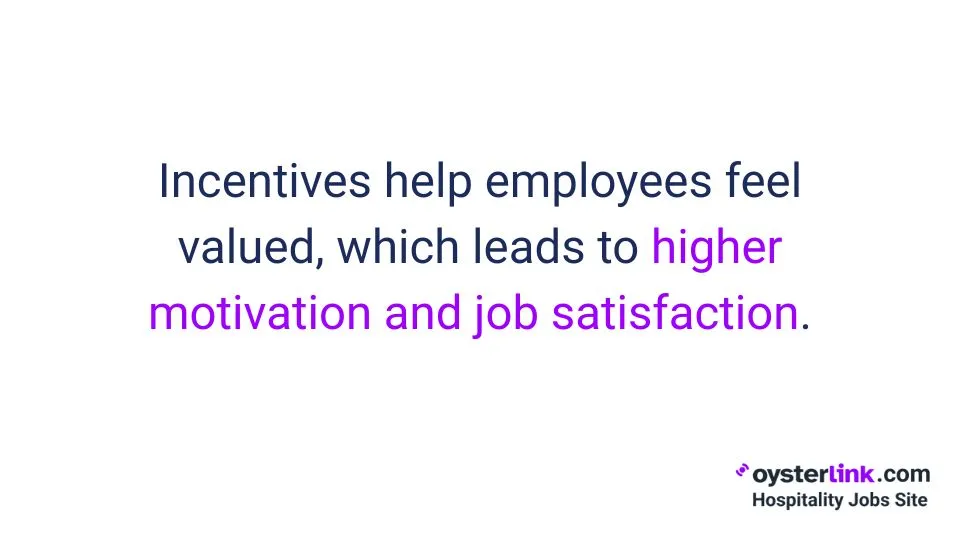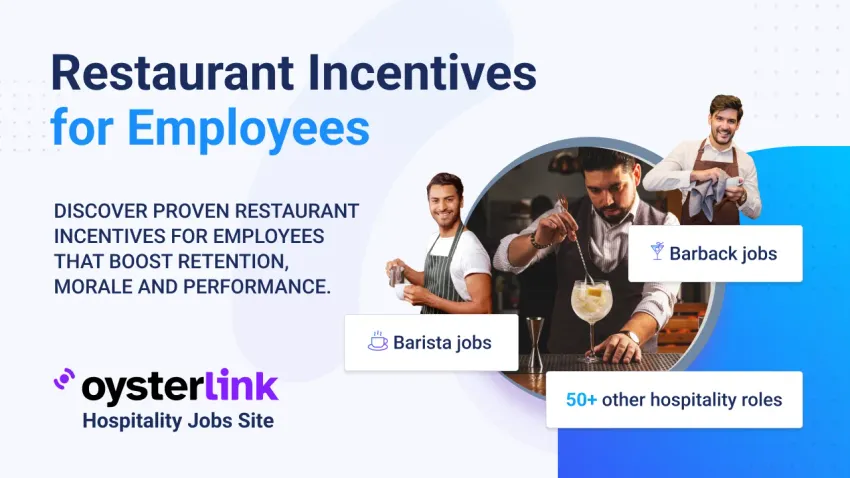Employee turnover in the restaurant industry is notoriously high, and keeping a motivated, engaged staff can feel like an uphill battle.
Offering competitive wages is essential, but it’s not always enough to retain great employees. That’s where restaurant incentives for employees come in.
A well-designed incentive program can boost morale, improve job satisfaction and create a workplace where employees actually want to stay.
Creative Restaurant Incentives That Really Work
Standard perks like free meals and discounts are appreciated, but they won’t necessarily make an employee think twice about leaving.
The key is to offer incentives that feel personal, meaningful and, most importantly, rewarding.
1. Flexible scheduling and time off
One of the biggest challenges in the restaurant industry is managing schedules. Employees appreciate flexibility, especially when it allows them to maintain a better work-life balance.
Here are some ways to make your scheduling more flexible:
- Let employees swap shifts easily without hassle.
- Offer priority scheduling for long-term or high-performing staff.
- Provide occasional paid mental health days or additional time off during slow seasons.
A little flexibility can go a long way in showing employees that their well-being matters.
2. Employee recognition programs
Public recognition is a powerful motivator. Instead of a generic “Employee of the Month” program, make recognition more personal and engaging.
Here are a few ideas for making your recognition more meaningful:
- Give shout-outs during pre-shift meetings for exceptional service.
- Create a rotating “MVP” award with meaningful perks, like a prime schedule pick.
- Offer handwritten thank-you notes or small surprise gifts for hard work.
When employees feel seen and appreciated, they’re more likely to stay engaged.
3. Health and wellness programs
Restaurant work is physically demanding, so providing wellness incentives shows you care about employees’ long-term health.
Consider these options to support your team’s health:
- Offer gym memberships or fitness class reimbursements.
- Provide free or discounted meals with healthier options.
- Give access to mental health resources, such as therapy sessions or wellness apps.
Supporting employees’ health keeps them energized, motivated and less likely to burn out.
4. Profit sharing or tip pools
Giving employees a stake in the restaurant’s success can be a game-changer. Profit-sharing or structured tip pools encourage teamwork and a sense of ownership.
Consider these options for profit sharing and fair tip distribution:
- Offer a small percentage of monthly profits to employees based on performance.
- Implement a fair tip-pooling system that ensures equitable distribution.
When employees feel invested in the restaurant’s success, they naturally perform better.
See also: How To Split Tips by Hours: Tip Pool Formula Explained
5. Unique experiences and perks
Sometimes, the best incentives aren’t monetary but experiential. Consider offering exclusive perks that make employees feel special.
Here are some creative ways to offer unique perks:
- Organize private staff dinners with Chef-curated meals.
- Host cooking or mixology classes for team members.
- Offer employees VIP access to special events or restaurant openings.
These experiences create lasting memories and a sense of belonging.
6. Professional development opportunities
Many restaurant employees have long-term career aspirations in the industry. Supporting their growth can lead to higher retention and a more skilled workforce.
Consider offering professional development programs such as:
- Cover costs for food safety certifications or wine sommelier courses.
- Offer mentorship programs with senior staff.
- Provide leadership training for employees interested in management roles.
Employees are more likely to stay if they see a future at your restaurant.
7. Team building and social events
A strong team dynamic improves communication and job satisfaction. Organizing fun activities outside of work helps strengthen bonds.
Here are some ways to foster teamwork through fun events:
- Plan team outings like bowling, escape rooms or outdoor adventures.
- Host themed staff appreciation nights with games and prizes.
- Encourage friendly competitions, such as cocktail-making contests for Bartenders.
When employees enjoy working together, they perform better as a team.
8. Special bonus systems for high-performing employees
Rewarding high achievers is a great way to motivate employees. Bonuses don’t have to be large; they just need to be meaningful.
Here are some bonus ideas to reward top performers:
- Offer cash bonuses for upselling menu items.
- Provide a free meal or extra break for perfect attendance.
- Give paid time off to top performers.
Clear goals and tangible rewards keep employees engaged.
9. Surprise “just because” rewards
Unexpected rewards can have a powerful impact on morale. A small surprise at the right time makes employees feel genuinely appreciated.
Consider these “just because” reward ideas:
- Hand out random gift cards for outstanding service.
- Offer an extra day off after an especially tough shift.
- Surprise staff with free massages or self-care kits.
The element of surprise keeps things exciting and boosts motivation.
Why Restaurant Incentives Matter
Providing incentives isn’t just a nice gesture — it’s a strategic move that benefits both employees and the business.
When staff members feel appreciated, they’re more likely to stay, perform well and deliver excellent customer service.
Working in a restaurant can be demanding, both physically and mentally. Whether it’s a Server juggling multiple tables during a rush or a Line Cook handling dozens of orders at once, the job requires resilience.

A well-structured incentive program creates a culture of appreciation, making employees feel like they’re more than just a number.
This, in turn, leads to better performance and stronger team morale.
Boosting retention and reducing turnover
The restaurant industry faces one of the highest turnover rates of any sector.
According to industry reports, many employees leave within their first year, citing burnout and lack of appreciation as key reasons.
Implementing incentives can significantly reduce turnover by giving employees a reason to stay.
When people see that their hard work is recognized and rewarded, they’re more likely to remain committed to their role rather than looking for opportunities elsewhere.
Improving customer service and overall performance
Happy employees create happy customers. When employees feel incentivized, their enthusiasm translates into better service, leading to higher guest satisfaction and increased sales.
A motivated Server will go the extra mile to ensure guests have a great experience, while an engaged Bartender will build strong relationships with regulars, keeping them coming back.
When incentives are tied to performance, it creates a win-win situation for both employees and the business.
The Importance of Creativity in Incentives
Basic benefits like staff meals and discounts are appreciated, but they don’t always create lasting motivation. Employees crave unique, meaningful incentives that make them feel valued as individuals.
Every team is different, so it’s important to tailor incentives based on employee preferences. Conduct surveys or have open discussions to learn what matters most to them.
A Line Cook might prefer a new set of high-quality knives, while a Server may value additional time off. Customizing incentives makes them more impactful.
How To Implement Creative Incentives Effectively
It’s not enough to simply offer creative incentives; implementing them in a way that is clear, fair and impactful is key to their success.
Here’s how you can make sure your incentive programs are both effective and sustainable:
- Communicate clearly: Make sure employees understand the incentive program and how they can participate.
- Be fair and consistent: Ensure all team members have access to rewards, regardless of role.
- Listen to employees: Ask for feedback and adjust the program based on their needs.
- Review and improve: Track the success of incentives and update them regularly to keep them fresh.
Discover How OysterLink Can Elevate Your Restaurant Team
Providing restaurant incentives for employees isn’t just about rewarding hard work — it’s about building a workplace where people want to stay and thrive.
A well-thought-out incentive program can improve morale, reduce turnover and lead to better overall performance.
If you’re looking for more ways to attract and retain top restaurant talent, check out OysterLink.
Whether you’re hiring new staff or refining your employee incentives, OysterLink helps Restaurant Managers connect with skilled professionals and build stronger teams.









Loading comments...